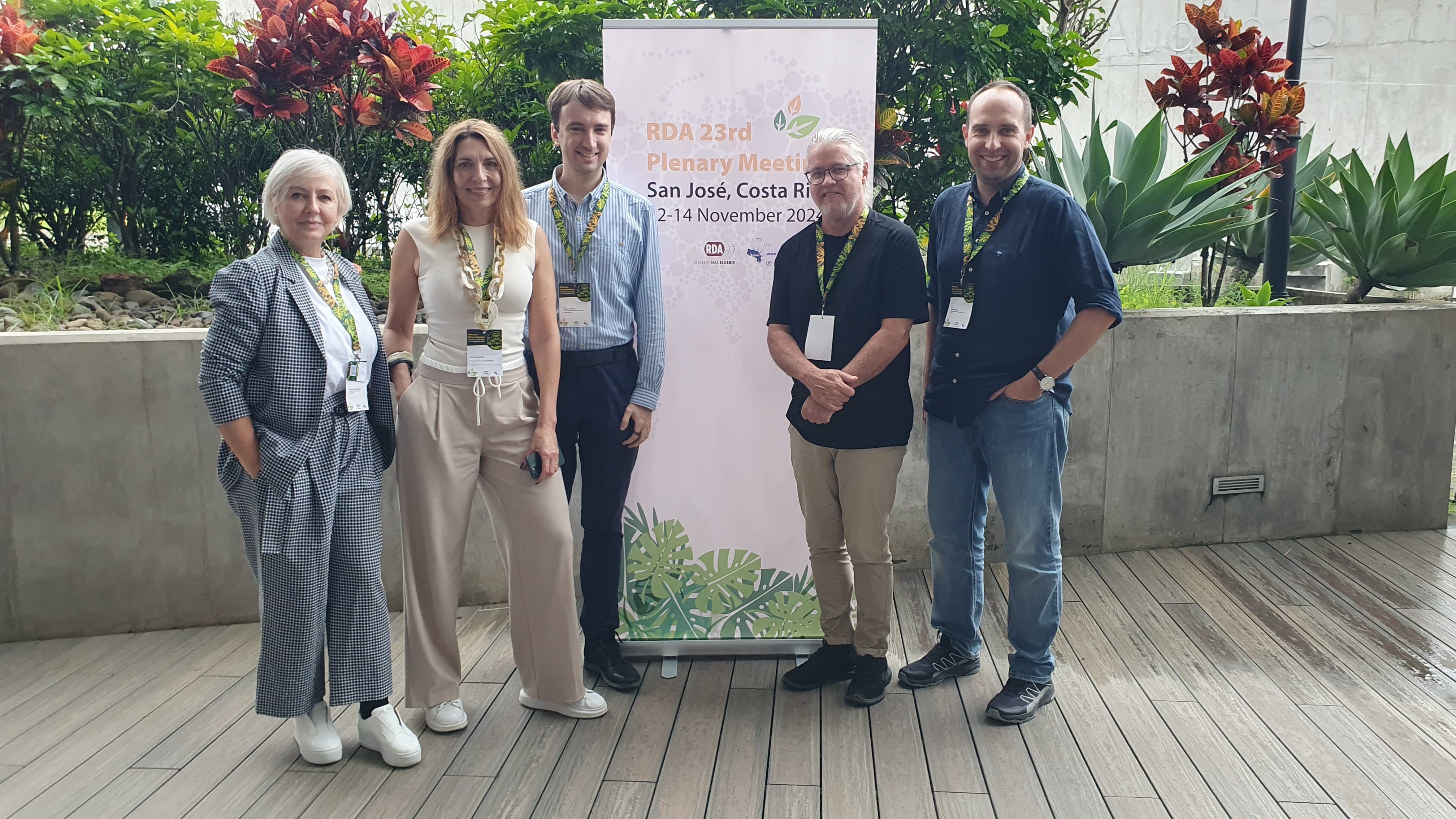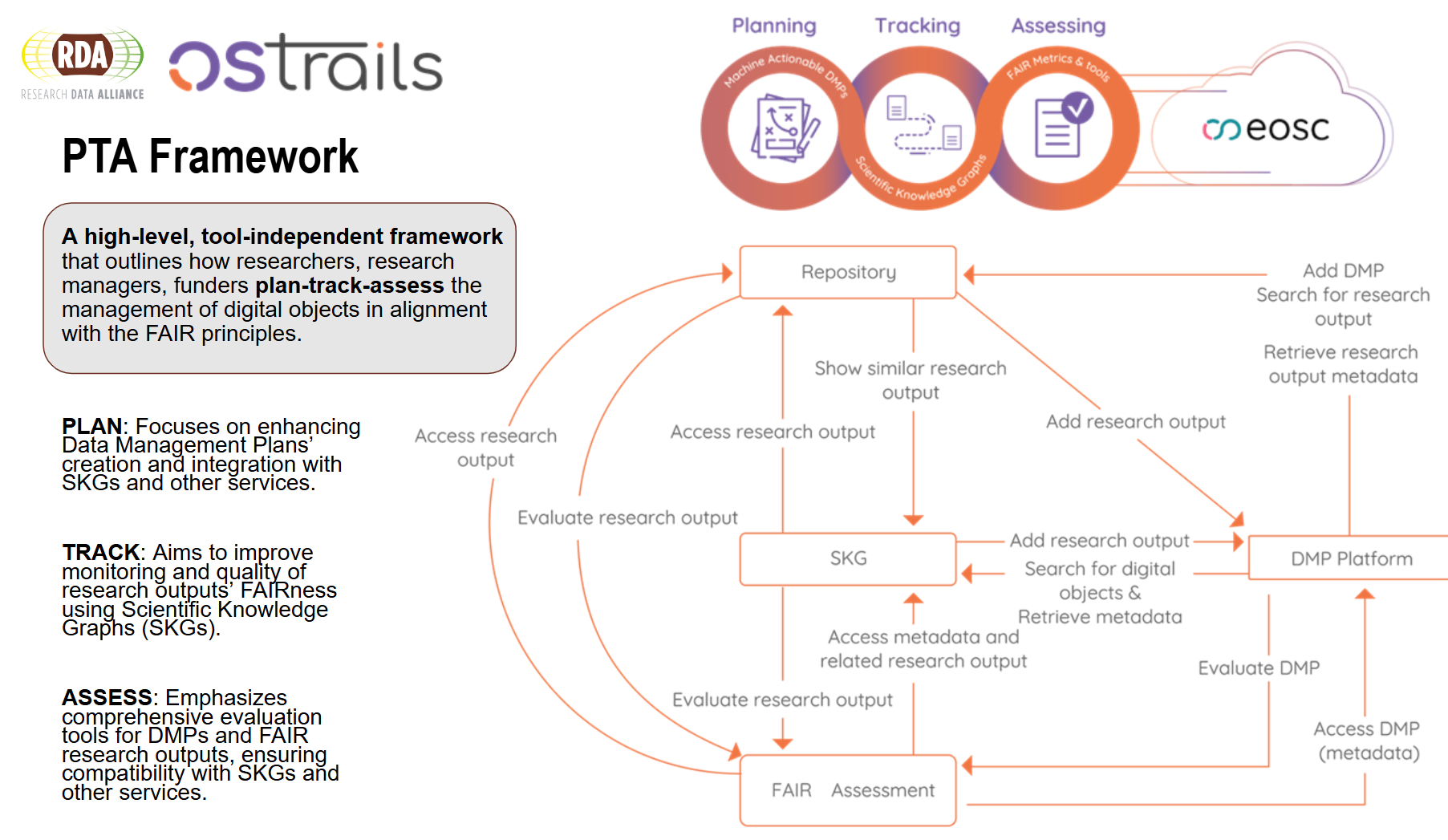Advancing machine actionability beyond Europe: Highlights from our contributions at the RDA Plenary in Costa Rica
OSTrails going global
The last edition of theRDA Plenary Meeting that took place in Costa Rica, found many OSTrails partners in the rainy paths of San Jose while others enjoyed the event online using the Whova app. OSTrails was represented byElli Papadopoulou (ARC), Marek Suchánek (CVUT), Tomasz Miksa (TUWien), Anca Hienola (FMI), Susanna-Assunta Sansone (UOXF), Wim Hugo (Dans/Knaw), Daan Broeder (CLARIN), Tassos Stavropoulos (OpenAIRE).
 OSTrails Partners Onsite at RDA Plenary.
OSTrails Partners Onsite at RDA Plenary.
In both cases, participation was active in different sessions to communicate the project’s approaches to advancing FAIR principles and interoperability with a focus on enhancing Data Management Plans (DMPs), integrating Persistent Identifiers (PIDs), and fostering a FAIR Digital Object ecosystem. These included topics like ensuring the quality and sustainability of data management, gamifying RDM practices, leveraging tools for curation, and advancing global recommendations for research commons. Specifically, for the latter the dedicated session on DMPs emphasised OSTrails’ commitment to collaborating and aligning practices globally by establishing a common maDMP API and refining interoperability frameworks.
Towards a common API formaDMPs
Co-chairs of theActive DMPsandDMP Common Standardsgroups—Elli Papadopoulou (DC), Tomasz Miksa (TM), and Marek Suchánek (WPL)—ledthe session“Active Data Management Plans: What are the actions that we need to realize them?”. Rooted in theSalzburg Manifesto,the agenda wascentred onforming new working groups to address API actions and DMP extensions,aligning effortswith initiatives like the European Open Science Cloud (EOSC) andDataCite's DMP_IDs.It presented a draft Case Statement,solicited feedbackto create a12–18-month workplan, and encouraged community engagement to refineobjectives andestablish a comprehensive roadmapformaDMP adoption and interoperability. The session served as a platform topresent preliminary results from theOSTrails project, including the Plan-Track-Assess Pathways and interoperability frameworks outlined inearlyproject deliverables (D1.1: Plan-Track-Assess Pathways,M4_Interim Products Establishment for Cross-Task Collaboration).
OSTrailers were joined by otherRDAcommunity contributorswhoshared their views and activities towards advancingmaDMPs in their regions. Becky Grady from theUniversity of California highlighted enhancements in the DMP Tool that is widely used in theUS, including ongoing developments to makeit fully machine-actionable and integrate API-based functionalities. Elli PapadopouloufromARCpresented theEuropeanperspectivereflected in theOSTrailsPTA framework, emphasising planning, tracking, and assessing data management aligned with FAIRprinciples.Marek SuchánekfromCVUTaddressedmaintenance efforts for the RDA DMP Common Standard, while Tomasz MiksafromTUWienintroducedtheidea for anew working groupthat iscentred aroundastandardised API, aimed at increasingtechnicalinteroperability ofmaDMPs.
 OSTrails PTA Framework.
OSTrails PTA Framework.
Community discussions - Takeaways
Interactive discussions explored thedifferent applications of maDMPs across different settingse.g. research infrastructure vs funding-oriented, including their adoption in tracking research outputs and aligning with evolving metadata standards. Participants stressed theimportance of fostering interoperability among Research Data Management (RDM) tools and services, addressing challenges like balancing technical complexity with usability. The session concluded with concretenext steps, such as submitting a proposal for the new working group, finalising updates to the DMP Common Standard, and encouraging broader community engagement through shared resources and pilots.
Learn more:
